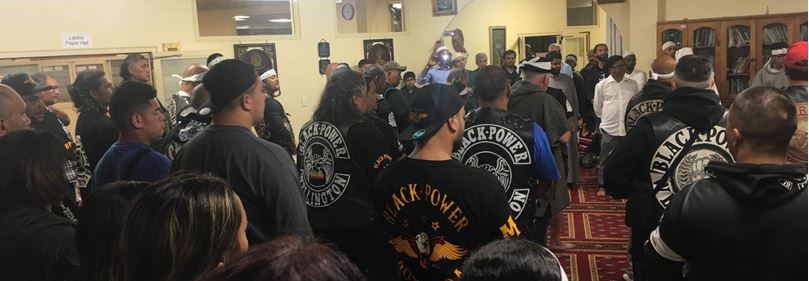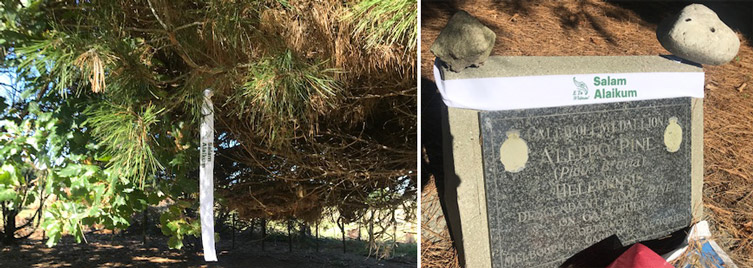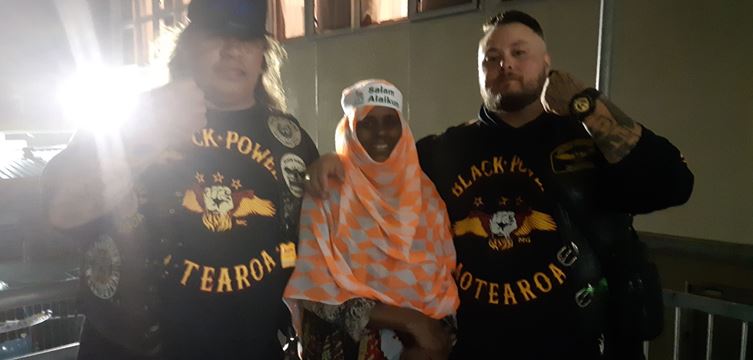Salaam Alaikum. Peace be upon us all. Aotearoa is experiencing an extended tangi. Like any such event emotions ebb and flow, sneak up on you, get you when you are not looking. A frightening thought, “that terrible event could have occurred at a marae”, an image of a child that reminds of the outrage, a surge of pride and confidence seeded by the sight of a uniformed female police officer, Michelle Evans, at the gates of Memorial Park Cemetery in Bromley, Christchurch: body armour, hijab, rose and rifle, wahine toa! We will be alright.
Friday the 29th March 2019 saw the metaphoric national nehu, the pause for burial, the crescendo of grief, and the eventual denouement as we reflect, debate, and begin to make necessary change to accommodate new circumstances and fresh possibilities. For Aotearoa this is a major discontinuity, and in such a liminal space the only thing about which we can be sure is that we can’t be sure.
We must ourselves determine what will be, ensure that what must be done is done to secure an inclusive loving peace. Throw out the baggage of “othering”. One thing I’m going to do is to take no more crap from the perpetrators of invective and of hate speech. I’ll not use this column to advance my cause in a specific instance, but to those who have ears to hear, fair warning given.
Last Saturday (23rd March 2019) I arrived at the Wellington Islamic Centre, the Kilbirnie Mosque, early in the evening, ahead of our convoy of Black Power and Mongrel Mob leaders, partners, and children. Some eighty or so of us had been gathered in waananga since Friday at the Wainuiomata Marae. We had been working hard on identifying and planning a productive future for our respective roopu and the whanau within them.
Collectively, all over the country, gang members had identified, at a visceral level, with the plight of our Muslim whanau, following the outrages at the Al Noor and Lincoln mosques in Christchurch the previous Friday. Many of our gang whanu are familiar with the horror of murder and the fear and distress that follows. It goes with the turf of being a gang member. Moreover, we identify with the status of being ‘other’, suspects, outsiders.
There was a steady flow of people coming into the mosque for evening prayer. The female police officer guarding the mosque encouraged me to enter. I said I was waiting for the rest of the crew. “Gang members, Mob and Blacks” I said, “probably about sixty of us”. She was a bit taken aback. “Have you advised the Police?” she enquired. “No, why? But I understand that the leaders of the Islamic Centre know that we are coming”. “What say they don’t want you to come in? How will you respond?” “We come to support, not to impose. We will follow their instructions to the letter”. She went off to consult.
The mosque spokesman appeared. “Welcome, welcome” he said. “Please come in this way”. The call went out, “Nga wahine ki mua.” “Women to the front” as we would do upon entering a marae. Its an interesting phrase considering our current circumstances and the leadership of our Prime Minister. It could also be interpreted as meaning “women for the future”. Worth pondering upon anyway.
We took our shoes off, that’s the norm at a whare. There seemed to be no issue about the men wearing their patches. The fact that we are who we are was the very point, two groups reputedly intolerant of each other. It seemed self-evident that the different roopu would be dressed in their respective colours. The common shared article of dress was a little white strip of cloth, worn as an armband or headband, emblazoned in green with words of love “E Tu Whanau -Salam Alaikum” (Stand tall whanau – Peace be upon you). We were welcomed, profoundly, fulsomely.
The Iman first recited a verse from the Holy Qaram and then gave us a little homily in English. He told us there were only two states of being: joy, happiness when things go your way, by the will of Allah the munificent, peace be upon him; and, when things don’t go your way, patience.
As a collective of manuhiri, we responded. Firstly, by way of karakia from our two Ringatu kaumatua, and then with haka. Finally, I was asked to speak. As we had come into the Mosque someone pressed a book into my hands. It was the Holy Qaran, and, as I spoke, instinctively, conditioned perhaps by my ecclesiastical training, I held the sacred tome, cover forward, out in front of me. The Iman fixed me in the eye, and, with the most subtle of smiles, nodded towards me in appreciation.
We were given a tour of the mosque, and, as we went, were given information fundamental to the Muslim faith. We were greeted, feted with food, and repeatedly thanked for our demonstration of solidarity.

So, there we were, saying farewells, when I was called to speak with a policeman. The fact that this was a man was significant, because the two armed-officers guarding the mosque were both women, including the one who had previously ascertained our intent.
The policeman was already giving Edge Te Whaiti from Mongrel Mob Notorious a tutorial and decided I needed tuition as well. He was holding forth on appropriate attire, the acceptable code of dress for visting a mosque. He was a Senior sergeant – I know that because I once said “sergeant”, and he quickly interpolated, with a stern frown, “Senior!” – clearly, passing the exam meant a lot to him.
The Senior had decided that, in his view, acceptable attire at a mosque did not include gang patches. I reminded him that the mosque was not a governmental building where laws of exclusion applied. Surely it was up to the leadership of the faithful to determine what we should or should not wear? The Senior said that the Iman had previously told him that he would not allow patches into the Mosque. He had concluded that the matter had not been raised with us because our strength of numbers was intimidating to the degree that the issue was too difficult for the leadership of the faithful to raise.
He insisted that were we to visit again patches were not to be worn. Edge and I both responded that if we were to be told that by the Iman or an official of the mosque that would be no problem at all, but that we’d rather hear from them directly. I suggested that he enquire of the Iman as to his thoughts following our visit because, in the positions I often find myself, a capacity to interpret body language is an essential protective factor. All I saw inside the mosque was an open-armed welcome regardless of garb.
The Senior Sergeant wasn’t at all happy. Clearly, we were in his box of “others”. Perhaps he suffers from” blue vision”, a sort of colour blindness that only picks up darker hues. I suggest that NZ Police introduce a new question into the Senior Sergeant’s exam. What’s the opening line of the second verse of out national anthem? (A: Ōna mano tāngata, Kiri whero, kiri mā, Iwi Māori, Pākehā, Men of every creed and race).
 Pine grown from seed from lone pine, Gallipoli at Featherston old army camp
Pine grown from seed from lone pine, Gallipoli at Featherston old army camp
I thanked the two female constables for their courage and for the symbolism of care and protection they projected to our Muslim whanau by their presence. We had a brief chat about the powerful image of their Christchurch colleague wearing a hijab and rose, and the courage shown by the two lightly armed officers who apprehended terrorist, and then we said our goodbyes.
I gave the senior a knowing nod of farewell.
If he read my telekinetic message it was that his female and junior colleagues had read the situation better than he. They knew “when to which”. Like many of his male colleagues he needs to “Ardern-up”, take off the colour lenses, and cease the ‘othering’. It’ll take time. We must be patient. Salaam Alaikum.
















Yes, national treasure.
Only during a crisis or a disaster do we take stock of the things that we take for granted. Denis is one of those people that country needs to stop taking for granted. A national treasure
Nga mihi e Nga Rangatira ❤️